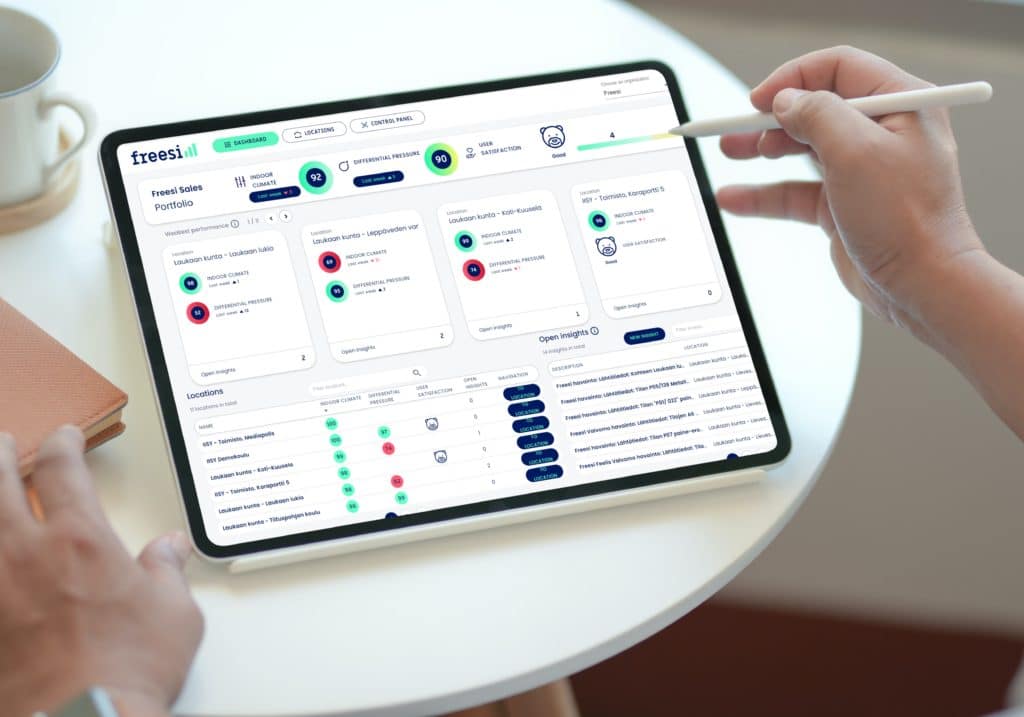Real estate is an industry that demands the highest standards of professionalism and responsibility. As a property owner or manager, it’s your job to ensure that your buildings are safe and comfortable and promote your tenants’ health and wellbeing. One of the most critical social responsibility aspects of creating a healthy indoor environment is monitoring indoor air quality. Not only does this promote a healthier environment for your tenants, but it can also increase the value of your property and attract tenants willing to pay more for a well-managed building. But how do you measure success in the social responsibility aspect at the portfolio level?
ESG provides framework for sustainable and ethical business practices
“ESG”, the generally used acronym for “Environmental, Social and Governance” is an approach that most real estate companies are adopting all around the world to create sustainable and ethical business practices and gain a competitive edge. In the real estate industry, ESG focuses on reducing environmental impact, promoting social responsibility, and ensuring good governance. This includes reducing energy consumption, promoting healthy indoor air quality, enhancing community engagement, and ensuring transparent and responsible business practices. By incorporating ESG principles into their investment strategies, real estate investors can create a sustainable and responsible investment portfolio and enjoy a competitive edge in the financial markets.

“ESG”, the generally used acronym for “Environmental, Social and Governance” is an approach real estate companies are adopting around the globe to better manage organizational risks and opportunities around sustainability issues.
Environmental aspect of ESG in real estate is already well considered but social aspect needs more attention
Most real estate professionals are familiar with working with the environmental aspect of ESG, focusing on reducing their portfolio’s environmental impact. This includes reducing energy consumption, promoting the use of renewable energy sources, and minimizing waste and emissions. To achieve these goals, real estate companies are adopting sustainable building practices, such as green building certifications, energy-efficient systems, and sustainable materials. As a result, most companies already have clear, measurable targets for the environmental aspect and are monitoring the success with specific measures. But how about the social part of ESG? How do you credibly measure success in that area?
Measure the most important social responsibility aspect with science-based metrics to make a difference
Today, more than focusing on the environmental aspect is needed. In recent years, there has been a growing awareness of the importance of indoor air quality and its impact on human health. Poor indoor air quality can cause various health problems, including respiratory and cardiovascular disease and cognitive impairment. As a result, a healthy indoor climate has become one of the most important social responsibility aspects in real estate. You’re taking the lead and pioneering the industry by setting science-based metrics and portfolio targets for social responsibility.

Focusing on social aspect in real estate is good for business
Studies have shown that tenants are willing to pay a premium for premises managed for indoor air quality. This means that by investing in monitoring and improving your indoor air quality, you can increase the value of your property and attract high-quality tenants willing to pay more for a healthy living and working environment. In fact, a survey by the National Apartment Association found that 58% of tenants would pay more for a property with improved air quality.
In addition to attracting high-quality tenants, monitoring indoor air quality can improve tenant retention rates. When tenants know you’re invested in maintaining a healthy indoor environment, they’re more likely to renew their leases and recommend your properties to others. This can lead to lower turnover rates and higher profits for your business.
With Freesi indoor climate management service you can monitor the success of your social responsibility measures at the portfolio level
In conclusion, monitoring indoor air quality is a crucial aspect of property management that can increase the value of your property, attract high-quality tenants, and promote the health and wellbeing of them. With Freesi indoor climate management you can set science-based metrics and portfolio targets for social responsibility. Don’t miss out on the opportunity to provide your tenants with the healthy living environment they deserve while also increasing the value of your portfolio.
If you would like to hear more on the subject, please feel free to book a meeting with us. We work with some of the largest asset management companies around the globe and we would be glad to discuss with you how we could assist you in your ESG efforts.
Want to learn more about indoor climate management? Check out our complete guide on indoor air quality monitoring for real estate professionals here.
